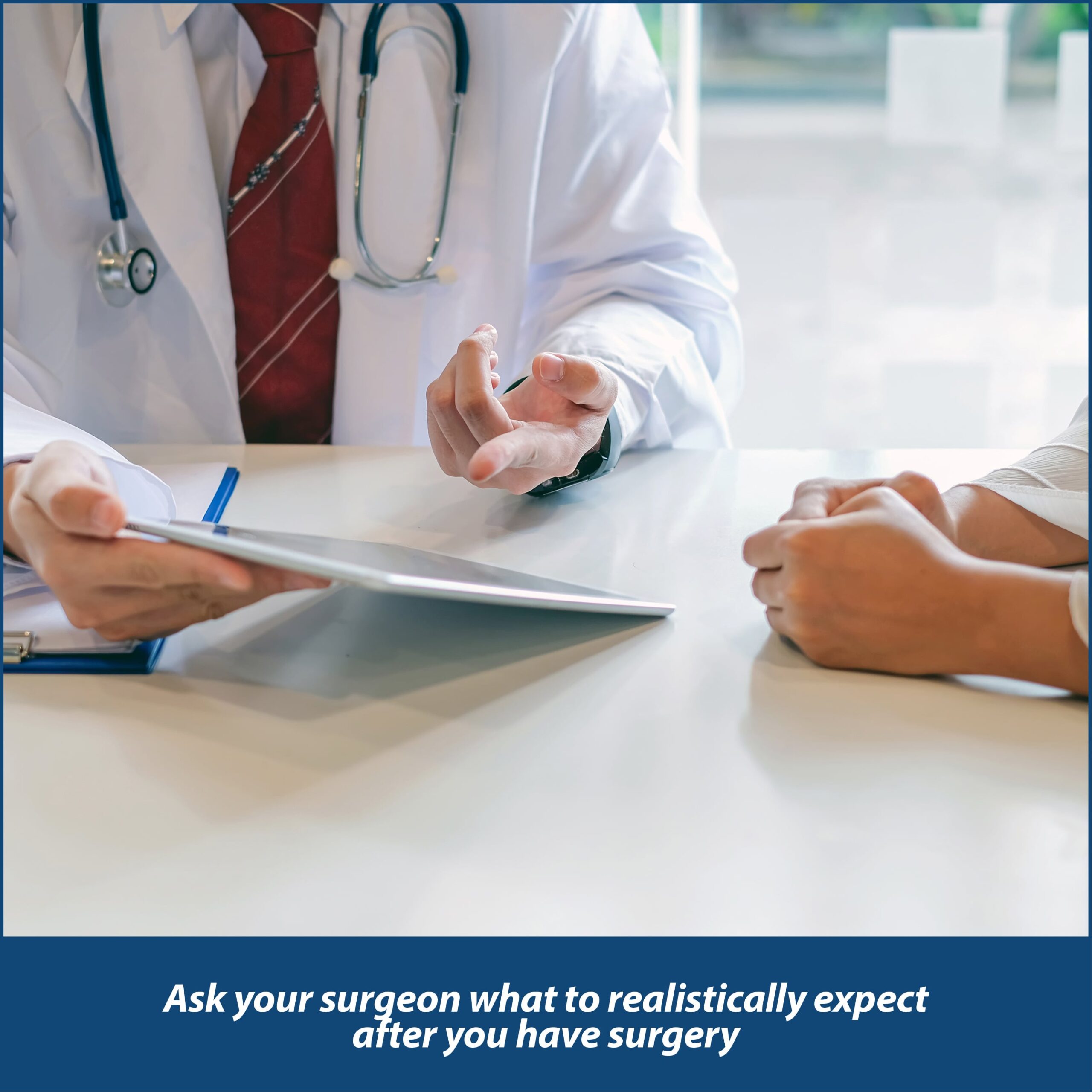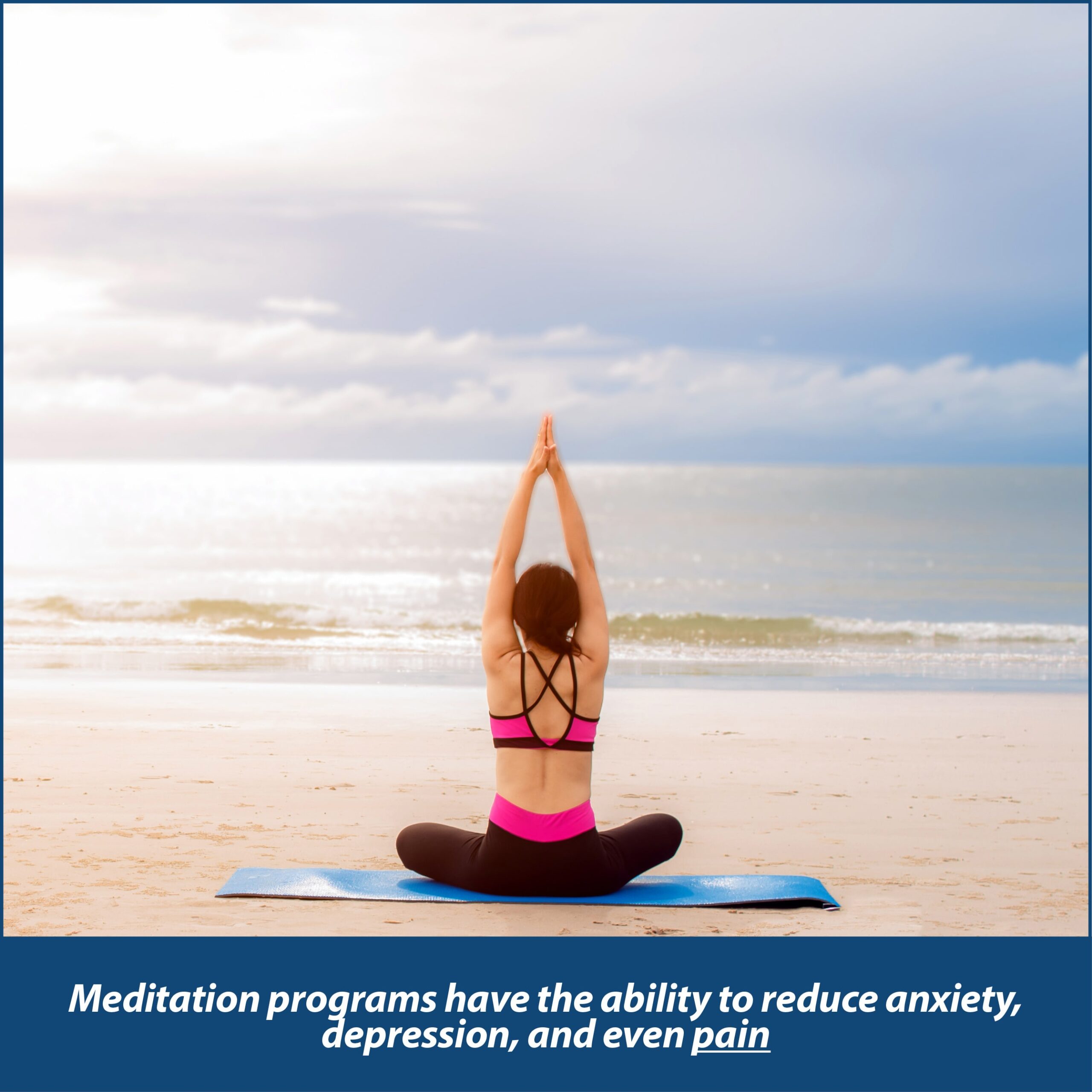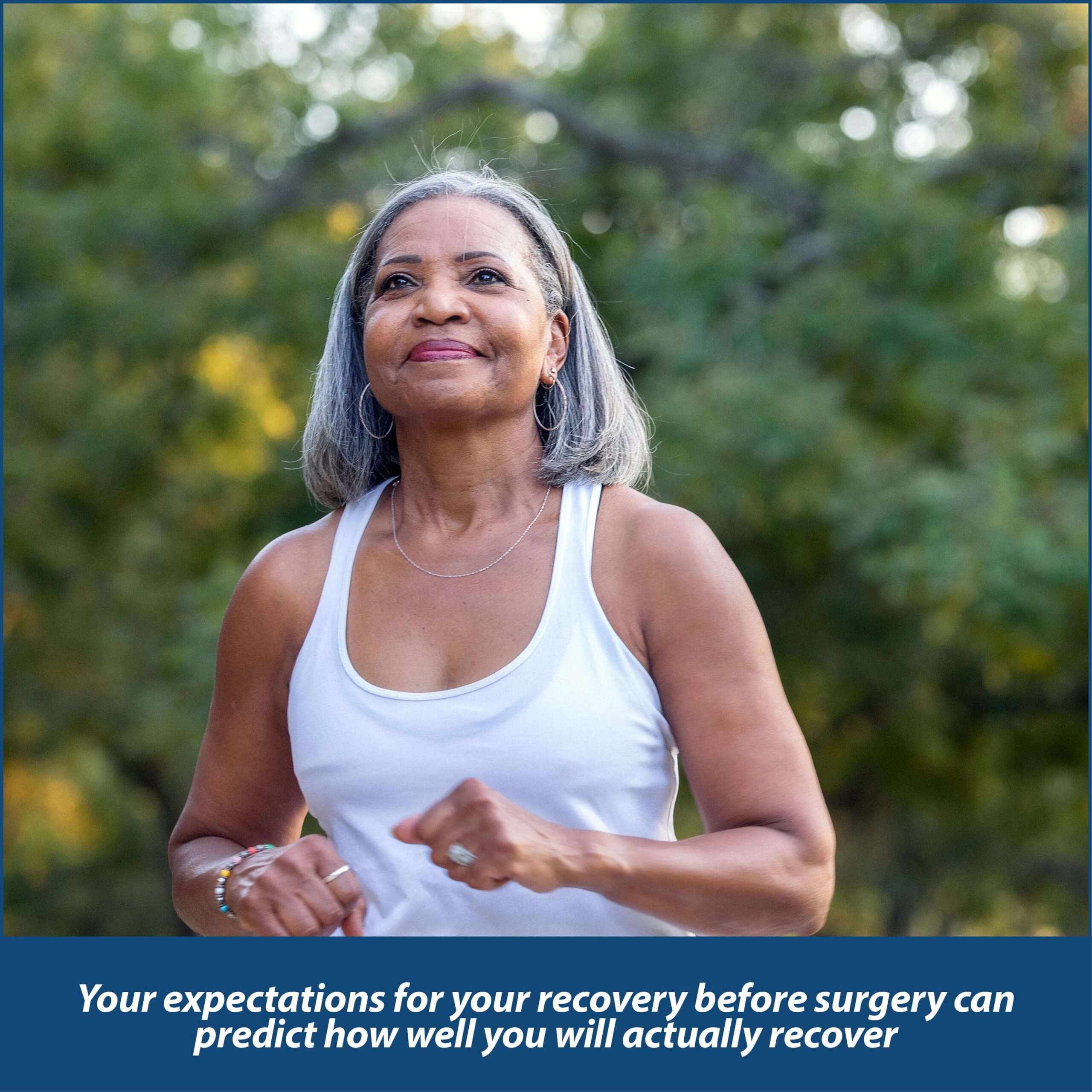
By: Katheryne (Kat) Downes, Ph.D., MPH
Director of Health Research, Outcomes & Evaluation
Florida Orthopaedic Institute
NOTE: This post is not a substitute or replacement for professional medical advice. If you have any questions about your medical condition or treatment, please seek your doctor’s advice.
Mind over matter. Mind-body connection. You have probably heard terms like this before. It is the idea that your mind is surprisingly powerful and can have a real impact on your body.
For many people, when you hear “mind-body connection,” you might think of something related to yoga and meditation. You might also think that it is just a bunch of new-age, touchy-feely nonsense. It turns out it is not! (But it did take a LONG time for us to figure this out). (1)
Until very recently, we really had no idea at all how powerful our brains are and how connected our brain is with various other parts of our body. A couple of my favorite wild examples of this:
A Gut Feeling
Just a few years ago, we discovered that there were receptors for neurotransmitters (brain chemicals) in our gut. That’s right; our gut is built to receive brain signals! Weird, huh? Even weirder, we found out that the bacteria that live in our gut can influence this relationship. (FYI: The technical term for this relationship is the “microbiome-gut-brain axis”) This really gives us a brand-new understanding of why stress/worrying makes us feel sick to our stomach! (2-4)
Monk Meditation Magic
Another fascinating example of the amazing way our mind and body are connected is the Tibetan monk meditation studies. In the early 1980s, a group of scientists decided to study Tibetan monks during meditation and discovered that, while meditating, the monks could raise their body temperature by as much as 17 degrees (which seems like it should be physically impossible)! They also noted that another group of monks were able to lower their metabolism by 64%! These kinds of studies show us that we are really at the tip of the iceberg of understanding what our brains can do when it comes to our bodies.
You can read more about the monk experiments here.
The Role of Your Mind in the Healing Process
So, what does this all have to do with your recovery after surgery?
Well, this may come as a shock, but your expectations for your recovery before surgery can predict how well you will actually recover. Your general mental outlook can also have an impact. If you expect that you will recover quickly, get back to your pre-surgery activities, have a good result, have minimal problems, etc., then that’s what tends to happen. But, the reverse is also true: if you expect a long, horrible recovery and lots of problems, that also tends to be a self-fulfilling prophecy. (5-6)
If you are someone who tends to be a little pessimistic (tending to believe that the worst will happen or that tends to focus on the bad parts of any situation), recovering from major surgery could be especially difficult.
On a physical level, your body’s ability to heal itself after surgery depends on the proper functioning of your immune system. There is strong science to support that depression is associated with delays in wound healing, higher infection rates, and can also cause an inflammatory response in the body. One of the more interesting findings is that antidepressants can help counteract these effects (which suggests there really is a direct connection between brain chemicals and immune system functioning!). (7-11)
It is also worth noting that this relationship (depression and bad immune system impacts) seems to get stronger as you get older. Since most joint replacement patients are in the 60+ range, this is especially important. (12)
When you are preparing to have surgery, your doctor will talk to you about the importance of getting yourself in the best possible shape before having surgery to have the best possible outcomes after surgery. You will probably have a pre-surgery physical therapy program designed to strengthen the muscles around the joint that you are having surgery on. We also know that nutrition is very important, so your doctor will talk to you about getting to a healthy weight and eating nutritious foods in the months before surgery. (For more info on the role of weight in total joint replacement- see our other blog posts).

Unfortunately, we don’t talk enough about preparing patients mentally for surgery, and as you have seen, this can be just as important as the physical preparations.
Brain-Boosting Pre-Op
Let’s say that you aren’t having any issues with depression or anxiety but just want to give yourself the best chance at an excellent surgical outcome. In this case, it’s a good idea to start by making sure you ask your surgeon what to realistically expect after you have surgery, including how long the recovery generally takes and what level of function you can expect after you are healed. The recovery process from most forms of orthopedic surgery tends to be long and can be frustrating, especially if you’re expecting it to be shorter than it is.
Beyond these conversations with your surgeon, you might consider mindfulness/meditation programs to help keep you in a good mental state both before and after surgery. And for the skeptics reading this, in 2014, the Journal of the American Medical Association (JAMA) published a review paper that found that meditation programs could reduce anxiety, depression, and even pain. (13)

AND you don’t need to do long sessions to see a benefit! Programs as short as 5-10 minutes have been shown to help! <sup>(14-15)</sup>
The best news of all is that it is now easy to access mindfulness/meditation resources – all from the comfort of your own home. If you have a smartphone and are comfortable using apps, there are a variety of great options out there like Calm, Headspace, and Ten Percent Happier Meditation.
[Note: Neither FOI nor the author receives any financial incentives for the apps mentioned above. These are simply a few of the most popular options out there.]
If you don’t like using phone apps, there are also great (FREE) options online that you can find just by searching on YouTube. There are programs for all sorts of things (sleep, stress, anxiety, productivity, etc.), with different time lengths depending on what you’re looking for.
If you are experiencing depression or anxiety before surgery, the recommendation would be to treat it the same way we would the rest of your body: we want to optimize your mental health and get you in as good of shape as possible before your surgery.
Mental health has had a stigma attached to it for a long time, but it really shouldn’t be looked at any differently than health for any other part of your body. Suppose you were having problems with your heart. In that case, you’d see a cardiologist, if you’re having problems with your bones/joints, you see an orthopedic surgeon, and if you’re having problems with your mental health, there are a variety of specialists to help you with that too.
There are now many different therapeutic options (some involve medications, some don’t) depending on what specific issues you are having. Discussion of the various options and programs is too large of a topic to be adequately covered here in the blog. We generally advocate for talking to a licensed professional to help you figure out what might be the best plan for you personally.
So, as a first step in this process, the old options of going to an office and talking to someone in person still exist, but now there are some great options for connecting to licensed professionals from the comfort of your own home too. Services like BetterHelp and Talkspace allow you to do video, phone, and chat sessions with a licensed professional without leaving your living room! If you have health insurance, there may be additional telehealth options available too.
[Neither FOI nor the author has any financial relationship with BetterHelp or Talkspace. These are just two of the most popular services.]
The bottom line here is that your mental health and expectations before surgery definitely play a role in your body’s ability to recover and heal after surgery. We want to encourage our patients to optimize their mental health the same way that they do their physical health so you can have the best possible outcomes after surgery.

REFERENCES
- Dossett ML, Fricchione GL, Benson H. A New Era for Mind-Body Medicine. N Engl J Med. 2020;382(15):1390-1391. doi:10.1056/NEJMp1917461
- ScienceMag.Org Article Post – Your gut is directly connected to your brain, by a newly discovered neuron circuit
- Lucas G. Gut thinking: the gut microbiome and mental health beyond the head. Microb Ecol Health Dis. 2018;29(2):1548250. Published 2018 Nov 30. doi:10.1080/16512235.2018.1548250
- Mittal R, Debs LH, Patel AP, et al. Neurotransmitters: The Critical Modulators Regulating Gut-Brain Axis. J Cell Physiol. 2017;232(9):2359-2372. doi:10.1002/jcp.25518
- Chahla J, Beck EC, Nwachukwu BU, Alter T, Harris JD, Nho SJ. Is There an Association Between Preoperative Expectations and Patient-Reported Outcome After Hip Arthroscopy for Femoroacetabular Impingement Syndrome?. Arthroscopy. 2019;35(12):3250-3258.e1. doi:10.1016/j.arthro.2019.06.018
- Filbay SR, Judge A, Delmestri A, Arden NK; COASt Study Group. Evaluating Patients’ Expectations From a Novel Patient-Centered Perspective Predicts Knee Arthroplasty Outcome. J Arthroplasty. 2018;33(7):2146-2152.e4. doi:10.1016/j.arth.2018.02.026
- Jian J, Yi-Heng H, Bang-Hui Z, et al. Effects of depression on healing and inflammatory responses of acute wounds in rats. Wound Repair Regen. 2019;27(5):462-469. doi:10.1111/wrr.12726
- Doering LV, Moser DK, Lemankiewicz W, Luper C, Khan S. Depression, healing, and recovery from coronary artery bypass surgery. Am J Crit Care. 2005;14(4):316-324.
- Walburn J, Vedhara K, Hankins M, Rixon L, Weinman J. Psychological stress and wound healing in humans: a systematic review and meta-analysis. J Psychosom Res. 2009;67(3):253-271. doi:10.1016/j.jpsychores.2009.04.002
- House SL. Psychological distress and its impact on wound healing: an integrative review. J Wound Ostomy Continence Nurs. 2015;42(1):38-41. doi:10.1097/WON.0000000000000080
- Vedhara K, Miles JN, Wetherell MA, et al. Coping style and depression influence the healing of diabetic foot ulcers: observational and mechanistic evidence. Diabetologia. 2010;53(8):1590-1598. doi:10.1007/s00125-010-1743-7
- Kiecolt-Glaser JK, Glaser R. Depression and immune function: central pathways to morbidity and mortality. J Psychosom Res. 2002;53(4):873-876. doi:10.1016/s0022-3999(02)00309-4
- Goyal M, Singh S, Sibinga EM, et al. Meditation programs for psychological stress and well-being: a systematic review and meta-analysis. JAMA Intern Med. 2014;174(3):357-368. doi:10.1001/jamainternmed.2013.13018
- Huberty J, Green J, Glissmann C, Larkey L, Puzia M, Lee C. Efficacy of the Mindfulness Meditation Mobile App “Calm” to Reduce Stress Among College Students: Randomized Controlled Trial. JMIR Mhealth Uhealth. 2019;7(6):e14273. Published 2019 Jun 25. doi:10.2196/14273
- Wielgosz J, Goldberg SB, Kral TRA, Dunne JD, Davidson RJ. Mindfulness Meditation and Psychopathology. Annu Rev Clin Psychol. 2019;15:285-316. doi:10.1146/annurev-clinpsy-021815-093423
